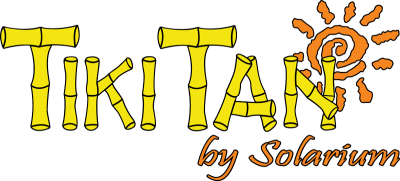South Bend, Indiana – An Indiana trademark attorney for Al Reasonover of Elkhart, Indiana sued in the Northern District of Indiana alleging that Solarium LLC of South Bend, Indiana (“Solarium”) and Solarium Bittersweet LLC of Elkhart, Indiana (“Solarium Bittersweet”)  committed trademark infringement of “Tiki Tan”, Trademark Reg. No. 2602388, which has been registered by the U.S. Patent and Trademark Office.
committed trademark infringement of “Tiki Tan”, Trademark Reg. No. 2602388, which has been registered by the U.S. Patent and Trademark Office.
In this complaint for trademark infringement and unfair competition, Plaintiff Reasonover states that he operates tanning salons under the Tiki Tan Mark and that he also develops tanning salons operated by others to whom he licenses the use of the Mark for a fee. Among these licensees, claims Plaintiff, is Solarium.
Reasonover asserts that, instead of displaying the Tiki Tan Mark as licensed, Solarium displays a service mark at its website reading “Tiki Tan by Solarium”. Reasonover also claims that, while he and Solarium entered into a licensing agreement that permitted Solarium to use the Mark only within a five mile territory around 4542 Elkhart Road, Elkhart, Indiana, Defendants Solarium and/or Solarium Bittersweet are operating additional tanning salons under the name “Tiki Tan” at 306 N. Bittersweet Road, Mishawaka, Indiana; 1290 E. Ireland Road, South Bend, Indiana and 215 E. University Drive, Granger, Indiana.
Plaintiff indicates that the licensing agreement neither permits Solarium to alter the Mark nor to use the Mark outside of the five mile territory around 4542 Elkhart Road, Elkhart, Indiana. He also claims that Solarium’s modification of the Mark to include its own name in connection with the promotion, sale and distribution of tanning salon services infringes on Plaintiff’s rights in his federally registered trademark, in violation of 15 U.S.C. Sec. 1114. Reasonover further alleges that Defendants’ actions are intended to cause, have caused, and are likely to continue to cause, confusion, mistake, deception among consumers, the public, and the industry as to whether Defendants’ services originate from, are affiliated with, sponsored by or endorsed by Plaintiff.
Finally, Defendants are accused of infringing the Mark intentionally, deliberately and willfully. The complaint, filed by an Indiana trademark lawyer, lists the following counts:
• Count I – Trademark Infringement – Injunctive Relief
• Count II – Trademark Infringement – Damages
• Count III – Common Law Trademark Infringement
• Count IV – Common Law Unfair Competition
Reasonover asks the court for:
• a finding that Defendants have violated 15 U.S.C. Sec. 1114; that Defendants have engaged in trademark infringement and unfair competition under the common law of Indiana; and that such conduct has damaged Plaintiff monetarily and in ways not adequately remedied by monetary damages alone;
• an injunction, preliminarily and permanently restraining Defendants from altering the registered Mark, “Tiki Tan,” in any way including but not limited to including the words “by Solarium” with the Mark; operating tanning salons at 306 N. Bittersweet Road, Mishawaka, Indiana; 1290 E. Ireland Road, South Bend, Indiana; or 215 E. University Drive, Granger, Indiana under the name “Tiki Tan”; engaging in any other activity constituting unfair competition with Plaintiff; and engaging in any other activity constituting trademark infringement or which deceives consumers or the public about the origin of services associated with Plaintiff;
• an order for corrective advertising;
• statutory damages or, alternatively, the disgorgement of all profits realized as a result of Defendants’ wrongful acts and also awarding Plaintiff its actual damages;
• a trebling of damages under 15 U.S.C. Sec. 1117;
• Plaintiff’s costs, attorney fees, investigatory fees, and expenses under 15 U.S.C. Sec. 1117; and
• pre-judgment interest on any monetary award.
Practice Tip: A trademark license may be granted by a licensor to a licensee to permit the licensee to use a trademark in a way that would otherwise infringe upon the licensor’s intellectual property rights. A license to use a trademark typically includes various restrictions. Those restrictions may include, among other things, limits on territory, term and manner of use.
The case was filed by Frank J. Agostino. The case was assigned to District Judge Philip P. Simon and Magistrate Judge Christopher A. Nuechterlein and assigned Case No. 3:14-cv-00235-PPS-CAN.
 Indiana Intellectual Property Law News
Indiana Intellectual Property Law News

